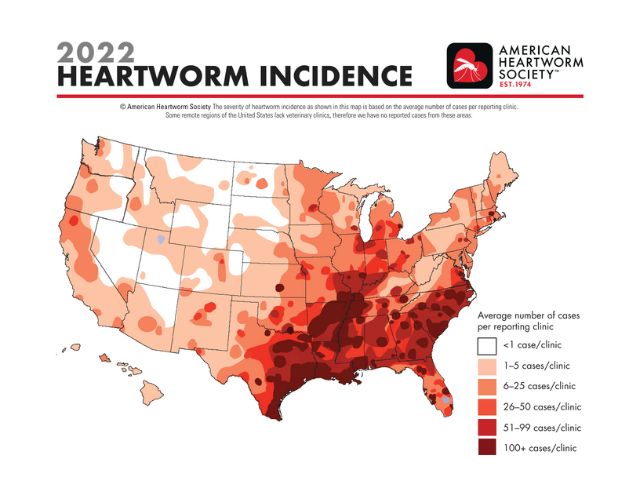Everything You Need To Know About Dog Heartworms
What are heartworms, and how do they affect dogs?
Heartworms are intravascular parasites that live in the heart, lungs, and associated blood vessels of affected animals. The presence of this parasite results in severe lung disease, heart failure, and damage to other organs of the body.
How does a dog get heartworm?
The mosquito is necessary for the completion of the heartworm life cycle and plays an integral role in disease transmission. Adult female heartworms living in an infected dog, fox, coyote, or wolf produce microscopic baby worms called microfilaria that circulate in the bloodstream. When a mosquito bites and takes a blood meal from an infected animal, it picks up these baby worms, which develop and mature into “infective stage” larvae over a period of 10 to 14 days. Then, when the infected mosquito bites another dog, cat, or susceptible wild animal, the infective larvae are deposited onto the surface of the animal's skin and enter the new host through the mosquito’s bite wound.
What are the signs of heartworm in a dog?
In the early stages of the disease, many dogs show few symptoms or no symptoms at all. The longer the infection persists, the more likely symptoms will develop. Active dogs, dogs heavily infected with heartworms, or those with other health problems often experience the most severe symptoms.
Signs of heartworm disease may include a mild persistent cough, reluctance to exercise, fatigue after moderate activity, decreased appetite, and weight loss. As heartworm disease progresses, pets may develop heart failure and the appearance of a swollen belly due to excess fluid in the abdomen. Dogs with large numbers of heartworms can develop sudden blockages of blood flow within the heart, leading to a life-threatening form of cardiovascular collapse. This is called caval syndrome and is marked by a sudden onset of labored breathing, pale gums, and dark, bloody, or coffee-colored urine. Without prompt surgical removal of the heartworm blockage, few dogs survive.
How will a veterinarian diagnose heartworm in a dog?
Testing requires just a small blood sample. The test is looking for specific proteins called antigens, produced within the reproductive tract of the female heartworm. Some veterinarians process heartworm tests right in their hospitals, while others send the samples to a diagnostic laboratory. In either case, results are obtained quickly.
When should my dog be tested for heartworm?
All dogs should be tested annually for heartworm infection, often performed during the annual wellness visit. If a dog is older than 7 months of age and not previously on a preventative, they need to be tested before starting a heartworm preventative. If your dog has had a lapse of their preventative for 2 months or longer, they need to be tested before resuming a preventive and then tested again 6 months later to ensure they are heartworm-free.
What happens if my dog tests positive for heartworm?
The good news is that heartworm infection in most dogs can be successfully treated. Due to the potential for a false positive test result, the diagnosis will be confirmed with an additional- and different- test. Your dog will be prescribed exercise restriction as normal physical exertion increases the rate at which the heartworm causes damage to the heart and lungs. The more severe the symptoms, the more restrictions on activity will be implemented.

The treatment protocol for heartworm infection involves several steps following the guidelines set by the American Heartworm Society. The initial phase of treatment is to resume heartworm prevention and dispense doxycycline. Doxycycline is effective against Wolbachia, a beneficial microorganism within the gut of the heartworm. This antibiotic weakens the parasite, making it more susceptible to treatment. After two months, your dog will be administered a series of three injections of melarsomine, which is toxic to the parasite. Nine months after the final injection, your veterinarian will perform a heartworm test to confirm that all of the heartworms have been eliminated.
Can heartworms be passed from dog to dog?
The short answer is no, this parasite cannot be shared or transmitted from one dog to another. Heartworms are only transmitted through the bite of a mosquito and the parasite must pass through a developmental stage within the mosquito before becoming infective.
What can I do to prevent my dog from getting heartworms?
Heartworm preventives come in different forms, including monthly chewable pills and topical “spot on” medications, as well as an injectable medication that is given every 6 or 12 months. Heartworm preventives are available only by prescription from veterinarians.
Some preventives only prevent heartworms, some protect pets from heartworms and intestinal parasites, and some protect pets from many different parasites, including heartworms, intestinal worms, fleas, ticks and mites. Because veterinarians know which parasites are common in the area in which they practice, owners should talk to their pet’s doctor about what product or products will be best for their dogs.
Is there a dog heartworm vaccine available?
There is currently no vaccine available for heartworm disease in dogs or cats. Heartworm prevention is achieved through the use of medications that kill or prevent the development of heartworms. These medications are typically administered monthly as chewable tablets, topical solutions, or injections. Some injectable medications provide protection for up to six or twelve months.
What should I do if I forgot to give my dog their heartworm preventative?
If your dog is late for their next heartworm preventative by 1 month or less, give the preventative right away and continue once monthly thereafter. If your dog has missed 2 months or longer, your dog must be tested and confirmed negative for the presence of heartworms before resuming prevention. Your dog will need to be re-tested in 6 months to confirm your dog is free of heartworms.
Is it safe to give heartworm preventatives to a pregnant or nursing dog?
Yes. Reproductive studies have demonstrated no evidence of adverse effects upon fertility, reproductive performance, or offspring of dogs and is considered safe during pregnancy and unlikely to pose a significant risk for the nursing offspring.
If you have questions regarding heartworm disease of dogs, contact Advanced Animal Care of Mt. Pleasant at (843) 483-5838. Our team of veterinarians are always here to help.
